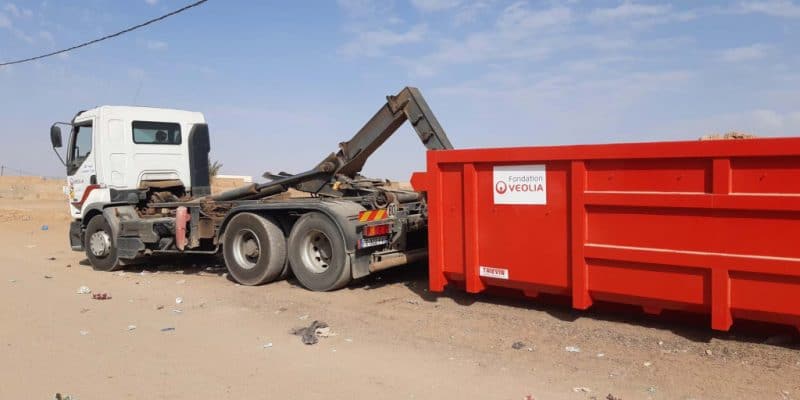A mission led jointly by the International Association of Francophone Mayors (AIMF) and the Veolia Foundation is improving waste management in Atar. In this town in west-central Mauritania, local authorities have been trained and equipped.
The city of Atar is at the center of an initiative to improve waste management and reduce greenhouse gas (GHG) emissions. This is thanks to a partnership between the municipality of Atar, the International Association of Francophone Mayors (AIMF) and the Veolia Foundation, funded by the French multinational Veolia. Through this partnership, the Veolia Foundation has provided the city with a JCB 20 T loader and two 20 m3 removable dump trucks.
The city has also acquired a Renault Ampliroll truck, which can load, move and unload the skips. The municipality also benefits from the advice of two experts from Veoliaforce, an initiative of the Veolia Foundation. The organization sent José de Graeve and Romain Duthoit from France to train local professionals in the waste management chain.
Towards waste recycling in Atar?
“The proper functioning of the machines was reviewed, and training was provided on loader maintenance (lubrication, levels, filters, etc.). We had to identify the best location to install the skips, and the Veoliaforce experts met with the informal waste collectors to better understand their issues,” says Veolia.
Read also- Urban sanitation, a major challenge for sustainable cities in Africa
The two experts also began work on waste characterization. The ultimate goal is to set up recycling channels. These achievements are in line with a support project launched in 2020 with the support of the AIMF to assess the city’s waste management needs, with funding of 150,000 euros shared between the three partners. This initiative aims to support the city of Atar in the management of its waste and thus reduce environmental pollution by methane gas from the fermentation of organic waste.
With a population estimated at between 20,000 and 38,000 inhabitants, Atar produces a significant amount of waste, some of which is collected and sent to an uncontrolled landfill located a few kilometers from the city center. And in the landfill, informal activities of scrap metal and cans recovery are developing. This situation is symptomatic of the difficulty Mauritanian cities have in managing their waste.
Jean Marie Takouleu







